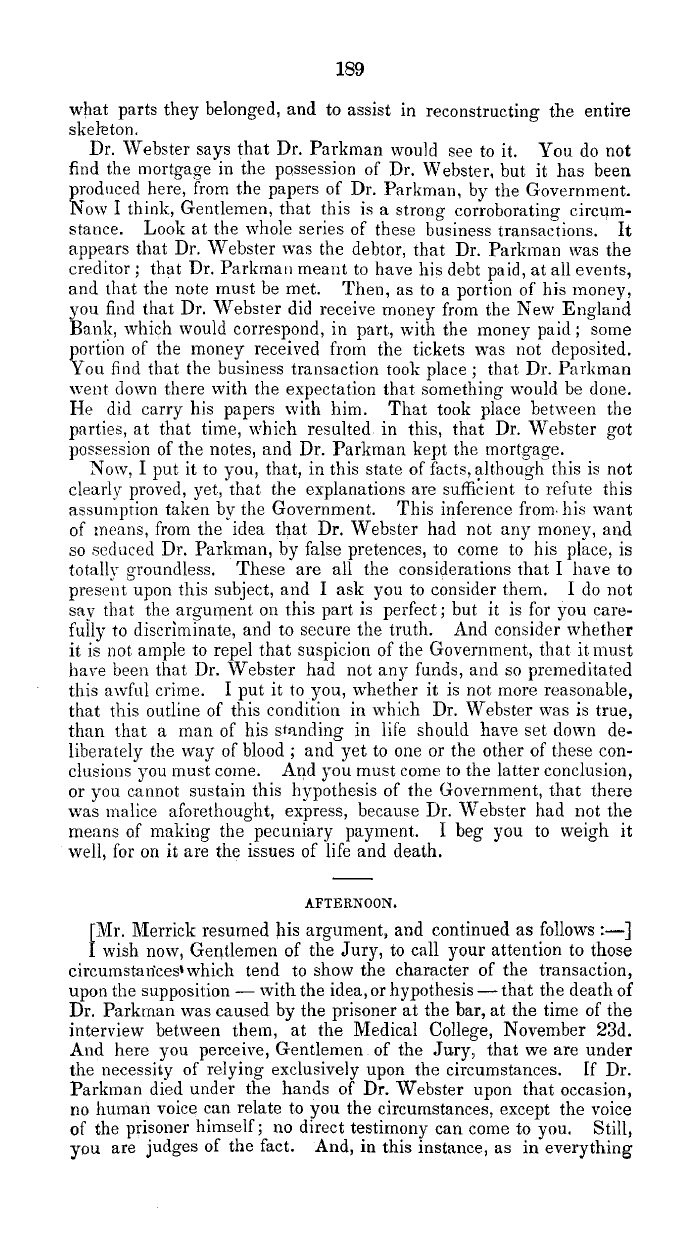|
189
what parts they belonged, and to assist in reconstructing the entire
skeleton.
Dr. Webster says that Dr. Parkman would see to it. You do not
find the mortgage in the possession of Dr. Webster, but it has been
produced here, from the papers of Dr. Parkman, by the Government.
Now I think, Gentlemen, that this is a strong corroborating circum-
stance. Look at the whole series of these business transactions. It
appears that Dr. Webster was the debtor, that Dr. Parkman was the
creditor ; that Dr. Parkman meant to have his debt paid, at all events,
and that the note must be met. Then, as to a portion of his money,
you find that Dr. Webster did receive money from the New England
Bank, which would correspond, in part, with the money paid; some
portion of the money received from the tickets was not deposited.
You find that the business transaction took place ; that Dr. Parliman
went down there with the expectation that something would be done.
He did carry his papers with him. That took place between the
parties, at that time, which resulted in this, that Dr. Webster got
possession of the notes, and Dr. Parkman kept the mortgage.
Now, I put it to you, that, in this state of facts, although this is not
clearly proved, yet, that the explanations are sufficient to refute this
assumption taken by the Government. This inference from, his want
of means, from the ~idea that Dr. Webster had not any money, and
so seduced Dr. Parkman, by false pretences, to come to his place, is
totally groundless. These are all the considerations that I have to
present upon this subject, and I ask you to consider them. I do not
sav that the argument on this part is perfect; but it is for you care-
fully to discriminate, and to secure the truth. And consider whether
it is not ample to repel that suspicion of the Government, that it must
have been that Dr. Webster had not any funds, and so premeditated
this awful crime. I put it to you, whether it is not more reasonable,
that this outline of this condition in which Dr. Webster was is true,
than that a man of his standing in life should have set down de.
liberately the way of blood ; and yet to one or the other of these con-
clusions you must come. And you must come to the latter conclusion,
or you cannot sustain this hypothesis of the Government, that there
was uialice aforethought, express, because Dr. Webster had not the
means of making the pecuniary payment. I beg you to weigh it
well, for on it are the issues of life and death.
AFTERNOON.
Mr. Merrick resumed his argument, and continued as follows :-j
wish now, Gentlemen of the Jury, to call your attention to those
circumstances, which tend to show the character of the transaction,
upon the supposition - with the idea, or hypothesis - that the death of
Dr. Parkman was caused by the prisoner at the bar, at the time of the
interview between them, at the Medical College, November 23d.
And here you perceive, Gentlemen of the Jury, that we are under
the necessity of relying exclusively upon the circumstances. If Dr.
Parkman died under the hands of Dr. Webster upon that occasion,
no human voice can relate to you the circumstances, except the voice
of the prisoner himself; no direct testimony can come to you. Still,
you are judges of the fact. And, in this instance, as in everything
|

